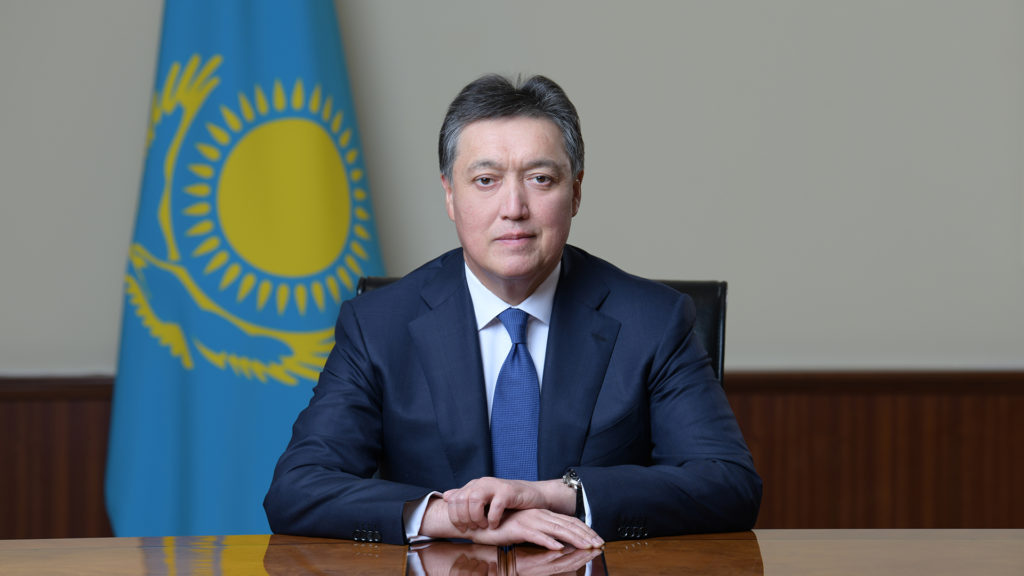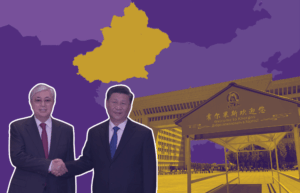In its first session, the newly elected parliament of Kazakhstan approved the re-appointment of Prime Minister Asqar Mamin. His is not the only familiar face to return after the ruling party Nur Otan once again obtained a majority in a parliamentary election the opposition was entirely absent from.
Kazakhstan’s newly elected lower chamber of parliament approved the appointment of Asqar Mamin as prime minister on 15 January. He had already held the position since February 2019 but had left it after a parliamentary election on 10 January this year.
By law, the government resigns after parliamentary elections. The president then nominates a prime minister, who must be approved by the Majilis, the lower house of parliament.
Want more Central Asia in your inbox? Subscribe to our newsletter here.
The former president and current leader of the ruling Nur Otan party, Nursultan Nazarbaev, asked his political faction to support Mamin’s candidacy on 14 January. “My opinion is that continuity should be preserved,” he said. “The government did its job despite all the difficulties. Compared to all other countries we did not do badly. If the president nominates Asqar Mamin, then I ask our faction to support his candidacy.”
Nazarbaev was president of Kazakhstan for nearly thirty years. He resigned in 2019 but still maintains considerable influence as leader of Nur Otan and chairman of the National Security Council.
An uncompetitive election
Mamin’s re-appointment is another sign the 10 January vote resulted in little change. According to the Central Election Commission, the same three parties remain in parliament, with Nur Otan obtaining 71.09% of the vote. The ruling party now has 76 of the 107 Majilis seats.
The two other parties in parliament, Ak Zhol (“Bright Path”) and the People’s Party of Kazakhstan (formerly the Communist People’s Party of Kazakhstan) won 12 and 10 seats, respectively. The remaining nine are elected by the Assembly of People of Kazakhstan, a body intended to represent the country’s different ethnic groups and chaired by Nazarbaev.
There were no opposition parties in the running after the All-National Social Democratic Party, the only authorised opposition, decided to boycott the vote. The Organization for Security and Co-operation in Europe, which sent a limited election observation mission to the Central Asian republic in addition to 24 long-term observers, noted a lack of genuine competition.
“The campaign was not competitive, and contestants did not substantially challenge their rivals on their political platforms. All contesting parties expressly supported presidential policies, limiting the choice for voters,” the organisation said in a statement. It also pointed out that “election observers from independent civil society organizations reported concerted efforts to prevent their effective election observation.”
The head of the limited election observation mission, Jaroslaw Domanski, was even more critical in an interview with the American media RFE/RL, pointing out “bad intention … bad practice, and a lack of goodwill” on the part of the Kazakh authorities.
The Kazakh media Vlast.kz reports that hundreds of protesters were arrested on the day of the vote, for the most part in the former capital Almaty. Among the arrestees were members of the unregistered Democratic party and of the civic movement Oyan, Qazaqstan (Wake up, Kazakhstan).
Familiar faces in old and new places
Asqar Mamin was not the only familiar face to return on January 15th. As Vlast.kz reports, lawmakers unanimously voted for the speaker of the Majilis, Nurlan Nyǵmatýlin, to keep his position. He was nominated by Nursultan Nazarbaev. The leader of the Ak Zhol party, one of the three factions in parliament, said: “Of course, another candidate could have been nominated as a matter or form. But being pragmatists, we understand that competing with such a leader from the parliamentary majority would be a mere formality.”
Read more on Novastan: Central Asia in 2020: the year in review
Nazarbaev’s eldest daughter Darıǵa Nazarbaeva is now a member of parliament for Nur Otan. She was speaker of the upper house until May last year.
Valentine Baldassari
For more news and analysis from Central Asia, follow us on Twitter, Facebook, Telegram, Linkedin or Instagram.
 Kazakhstan: Asqar Mamin reappointed prime minister after uncompetitive election
Kazakhstan: Asqar Mamin reappointed prime minister after uncompetitive election 



